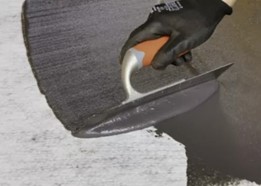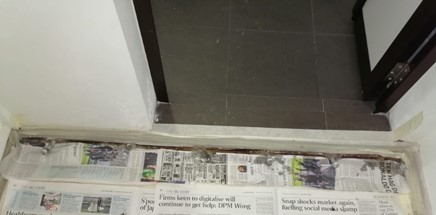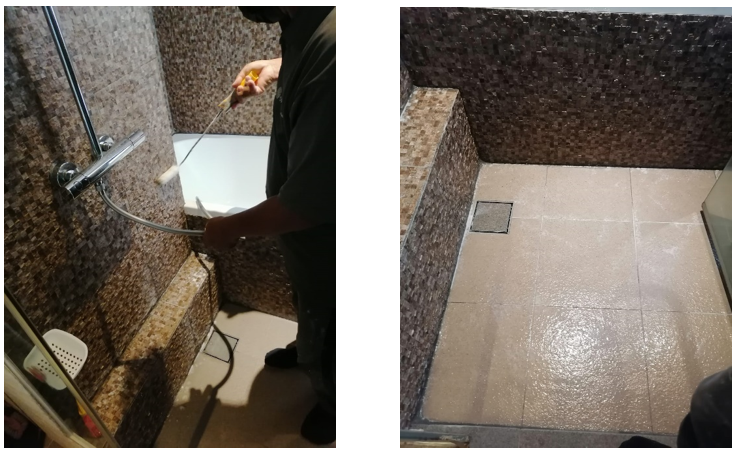Commercial buildings and homeowners are responsible to ensure their properties are all well-waterproofed for all occupants.
So how to fix waterproofing issue? By preventing leaks, correct waterproofing not only ensures building safety but also helps prevent loss of income and occupants’ health. These stains caused by water seepage, can not only make the homes look bad but also cause structural damage and allergies. Damage to leaking walls and roofs can cause health concerns to all occupants. Research has shown damage from water leaks is about 80 percent of a building’s defects are due to wear and tear over time. Damp patches, black spots, and efflorescence are all signs your home needs waterproofing repairs.
Water seepage is one of the most common issues faced by homeowners in Singapore. Water seepage can happen due to the weather condition in Singapore. Constant rain can cause rainwater to slowly trickle through the structure causing damage. Both rain and sunshine affect the building. Water seepage is not just ugly but bad for occupants in the house and building structure.
Water remains the most common cause of cracks in buildings.
Waterproofing is extremely beneficial to protect interiors from water damage, so how do we fix waterproofing issue, and health problem for occupants such as mould allergies and respiratory systems?
Solution to waterproofing
The best waterproofing solution and how to fix waterproofing issue is by prevention of any type of filtration and subsequent degradation is to intervene under the substrate. For optimal results, the procedure should include the application of a waterproofing layer, on top of which is applied to provide protection and allows the outflow of water that percolates from the upper layer substrate.
Selecting a good and effective waterproofing solution is important to keep the waterproofing function across different temperatures and weather conditions. Therefore, various types of products are offered.
1. Bituminous waterproofing
Bituminous membranes are the most popular system used to waterproof under the substrate of the terrace, balconies, roofs, basements, bridges, and below-ground structures. These membranes are derived from the distillation of crude oil. It is also known as asphalt, a sticky black and highly viscous liquid or semi-solid form of petroleum.
Bituminous comes in different types of applications, such as Torch on, self-adhesive membrane sheet, hot melt bitumen, and liquid applied membrane
Bitumen liquid-applied membranes are the perfect solution for seamless, fully adhered, and safe waterproofing systems. They are polymer-modified bitumen emulsions that require no torch or flame to be applied. They are available as water-based or solvent-based coatings.
2. Polyurethane (PU) Injection grouting
Leaks in concrete, masonry, and natural stone structures can often be sealed and waterproofed by injection.
Polyurethane (PU) injection grouting is a waterproofing technique that injects polyurethane, to prevent water leakage through cracks or gaps in the concrete of the flooring, wall, and building structure.
PU Injection is a procedure of pumping cement-based, polyurethane-based, epoxy-based, or acrylic-based material into damaged or cracked structures to securely seal leaks, repair compromised structures and make them watertight again for long-term waterproofing.
The selection of the right injection materials is the first key factor for the success, effectiveness, and duration of waterproofing. The material’s viscosity and flexibility are important, which could significantly influence the effectiveness of the injection. Application and techniques must be followed by trained, skilled, and experienced contractors to ensure success and provide a complete, permanent leak-sealing solution.
PU injection grouting has a short curing time making it an ideal and fast solution for water leakage. As a result of its low viscosity, it can expand, and seal tiny cracks to prevent further leakage. The material is flexible after injection, allowing subsequent movement in the structure while keeping the gaps sealed.
We have understudied and provide the best waterproofing solution for our clients and homeowner. We provide a detailed step-by-step explanation of PU Injection Grouting works for our potential customers to understand its benefits.
PU Injection has the following benefits:
- Versatile polymer that has industrial applications for coating and insulation purposes.
- Strong Adhesive, Flexible, and tough, polyurethane will protect well against membrane cracks and building movements that could compromise waterproofing effectiveness.
- Highly elastic, which provides resistance to thermal expansion as well as deterioration due to exposure to sunlight.
- Fast drying, and the ability to seal the tiny and smallest hairline cracks on the concrete surface. Compare this to other methods which involve heavy hacking.
- Cost-effectiveness, low cost compared to hacking and re-waterproofing or restructuring work.
- Clean and less labour-intensive, such as noise and dust, contractor movement during the process of carrying out the waterproofing work.
- Required little to almost no further maintenance.
PU Injection is the most recommended waterproofing technique, the best solution that will prevent and stop seepage from occurring again in the future without the traditional hacking method to carry out the repair works. PU Injection grouting can also be applied in many areas where there is a visible leak. It is commonly used in areas such as drainage surroundings, ceilings of bathrooms, shower areas in the bathroom, kitchen, balconies, planter areas, patios, basements, retaining walls, and all other wet areas, it can be used to repair any water damage in the properties caused by rain or water leakage.
3. Clear Penetrative Treatment (CPT)
The Clear Penetrative treatment is one of the waterproofing membranes that is a transparent and penetrative waterproofing chemical solution that is applied to the bathroom walls and floors and will penetrate and react with the substrates to create a waterproofing barrier to prevent water ingress.
A waterproofing chemical solution is applied to the existing flooring to ensure water tightness of the substrates. This waterproofing solution is a non-invasive and cost-effective approach to waterproofing. They work well on all kinds of flooring such as ceramic tiles, marble, and granite flooring.
This is an effective treatment to apply over the existing balconies, bathrooms, floor and wall surfaces such as showers, and balconies without the need to hack and redo the entire waterproofing system. This application of Clear Penetrative Treatment (CPT) is quick and easy to apply on flooring and wall surface. Most importantly, this process is the least disruptive, mess-free, time-saving, and hassle-free for homeowners and neighbouring units.
It is non-toxic, odorless, and provides long-lasting protection, a high-performance solution, that strengthens the surface and gives an effective barrier between water and adjacent foundations. This membrane coating provides strong protection from alkalis, oil repellents, corrosive chemicals, and acids. It could extend the life of your retaining walls, bathrooms, showers, joints, and corners. It creates a strong bond with the tiles and flooring.
SWC Construction is one of the leading waterproofing contractors in Singapore, we specialize in waterproofing work. We have a team of professional contractors and consultants to assist homeowners to resolve the waterproofing issue.
We provide an on-site assessment to identify the water source and provide the best waterproofing repair solution to all homeowners and property owners. Contact us now to find out about our waterproofing services. We are confident to resolve all kinds of waterproofing damage with our well-trained workers and service team.






